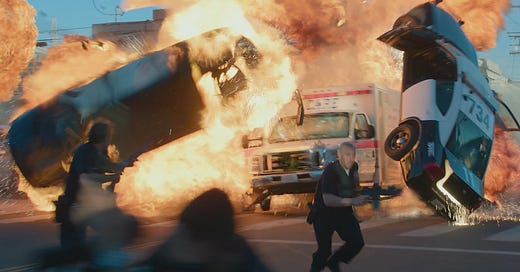At some point during a midday showing of Ambulance—Michael Bay’s 135-minute action movie that’s maybe 20 minutes of setup followed by nearly two hours of slam-bang nonstop climax—I was scribbling notes so hard and so excitedly in my 3.5x5.5-inch Field Notes book that the page I was writing on literally tore away from the spine of the pocket journal. My poor notebook was a casualty of Bayhem.
I’d like to think it was proud to make the sacrifice.
When I say Ambulance contains 20 minutes of setup, I mean it almost literally. I didn’t have a stopwatch running or anything, but the whole thing is a marvel of efficiency. As the curtain comes up, Will Sharp (Yahya Abdul-Mateen II) is on the phone with some faceless bureaucrat somewhere, trying to get his insurance company to sign off on a procedure for his wife. He then visits his brother, Danny (Jake Gyllenhaal), at Danny’s place of business, where we discover that a.) they’re practically estranged, b.) that Will needs to borrow nearly a quarter million for the surgery, c.) Will is retired from the military, and d.) that Danny will happily give him the money if he comes along on a bank robbery that’s starting in 30 minutes, come on, let’s go bro, hop in the back of the truck, your wife will never have to know how you got the money, let’s get a move on.
Meanwhile, a pair of cops are busy quoting Michael Bay movies to each other to psych one of them up to ask out a bank teller (this is a thing that actually happens) and we’re introduced to Cam Thompson (Eiza González), a nerves-of-steel EMT who wants to get enchiladas after tenderly caring for a little girl with a piece of iron-wrought gating through her gut.
The characterization here is quick and dirty and effective, and I don’t just mean of the characters: Bay himself is being characterized with those little nods to The Rock and Bad Boys. He is telling us that he’s aware of how you, the viewer, see him, and he wants you, the viewer, to be aware that he’s aware of how you see him. It’s a wink, an elbow to the ribs, a reminder that if you’re not onboard for what Bay’s about to do, why are you even here?
What Bay’s about to do is take us on a chase through the streets and highways and gangs and neighborhoods of Los Angeles, a gloriously multicultural mosaic of cholos and USC grads and the black and white bank-robbing brothers trying to stay out of jail with the aid of the Hispanic EMT in the back of the ambulance smashing through cop cars. And he’s going to do so while putting what seems to be every cent of his $40 million budget into blowing up vehicles of various sizes and smashing them into each other and flipping them off ramps. For a relatively cheap picture, it feels pretty expensive.

If you’re familiar with Bay’s house style you’ll see a lot of familiar stuff here: the quick cuts and upward angled corkscrews and exploding vehicles flying straight at the camera. But he’s added a new weapon to his arsenal this time around: drones. The effect is startling, particularly when the footage is edited into other scenes that use more traditionally minded cameras mounted on cars or gliding on dolly tracks or strapped to a helicopter or jostling about in the cameraman’s hand; we will occasionally come out of a tall building and plummet to the ground, spinning and twisting and somersaulting all about before cutting to a relatively staid helicopter shot before cutting back to the topsy-turvy drone.
I don’t think Bay’s quite settled on how to most effectively use this new tool. For every shot that’s clever and inventive—e.g., a relatively quick one in which a cop goes running through a small opening, the drone camera keeping pace right behind him and bursting through, allowing us the sensation of being right there with the officer—there’s another that feels just tossed in, a bit of flash for flash’s sake. And the effect is sometimes discordant, just as randomly cutting between Steadicam and handheld is discordant. Then again, it wouldn’t be Bayhem without a little disconcerting razzle-dazzle, now would it?
And Bayhem is at its best when it’s experienced as big and as loud as possible; the explosions in Ambulance literally shook my body as they went off around me in glorious surround sound. I still resent the fact that I wasn’t able to see 6 Underground in a proper theater, even if it was minor Bay. Which is why I’m mildly worried about the lack of box office response to Ambulance, which grossed $8.7 million in its opening weekend. That’s Bay’s worst opening, but it’s been a while since he put up huge numbers in a non-Transformers setting: 13 Hours, Pain & Gain, and The Island all grossed under $53 million domestic.
All of which is to say that Michael Bay, the Auteur of Awesome, may not be long for the biggest, loudest, and best screens money can buy. It wouldn’t be the worst thing in the world if he wound up as in-house talent for Netflix, I guess. But it would be a bit disappointing. Here’s hoping Ambulance has better legs than some of the other originals that have dropped in the post-pandemic era.





